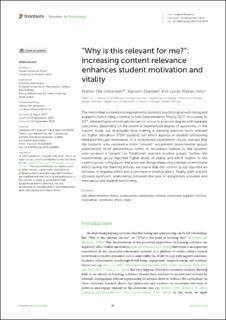| dc.contributor.author | Johansen, Marius Ole | |
| dc.contributor.author | Eliassen, Sigrunn | |
| dc.contributor.author | Jeno, Lucas Matias | |
| dc.date.accessioned | 2023-10-10T12:47:25Z | |
| dc.date.available | 2023-10-10T12:47:25Z | |
| dc.date.created | 2023-09-28T07:17:22Z | |
| dc.date.issued | 2023 | |
| dc.identifier.issn | 1664-1078 | |
| dc.identifier.uri | https://hdl.handle.net/11250/3095531 | |
| dc.description.abstract | The notion that motivation is imperative for students’ psychological well-being and academic functioning is central to Self-Determination Theory (SDT). According to SDT, different types of motivations can co-occur to a various degree with separate outcomes, depending on the extent of experienced degree of autonomy. In the current study, we investigate how making a learning exercise more relevant for higher education STEM students can affect aspects of student functioning mediated through motivation. In a randomized experiment, results indicate that the students who received a more “relevant” assignment (experimental group) experienced more autonomous forms of motivation relative to the students who received a “generic” or “traditional” exercise (control group). Further, the experimental group reported higher levels of vitality and effort relative to the control group. Using a pre- and post-test design measuring changes in emotional affect during the learning activity, we found that the control group reported an increase in negative affect and a decrease in positive affect. Finally, path analysis showed significant relationships between the type of assignment provided and motivation and student functioning. | en_US |
| dc.language.iso | eng | en_US |
| dc.publisher | Frontiers | en_US |
| dc.rights | An error occurred on the license name. | * |
| dc.rights | Navngivelse 4.0 Internasjonal | * |
| dc.rights.uri | http://creativecommons.org/licenses/by/4.0/deed.no | * |
| dc.title | “Why is this relevant for me?”: increasing content relevance enhances student motivation and vitality | en_US |
| dc.type | Journal article | en_US |
| dc.type | Peer reviewed | en_US |
| dc.description.version | publishedVersion | en_US |
| dc.rights.holder | Copyright 2023 The Author(s) | en_US |
| dc.source.articlenumber | 1184804 | en_US |
| cristin.ispublished | true | |
| cristin.fulltext | original | |
| cristin.qualitycode | 1 | |
| dc.identifier.doi | 10.3389/fpsyg.2023.1184804 | |
| dc.identifier.cristin | 2179657 | |
| dc.source.journal | Frontiers in Psychology | en_US |
| dc.identifier.citation | Frontiers in Psychology. 2023, 14, 1184804. | en_US |
| dc.source.volume | 14 | en_US |

